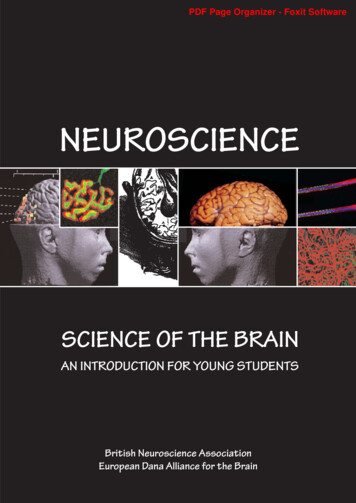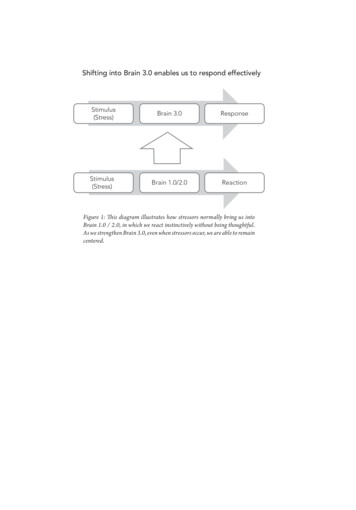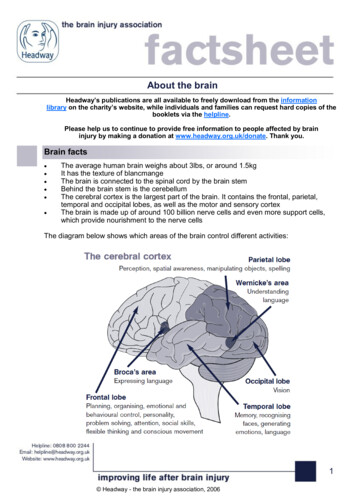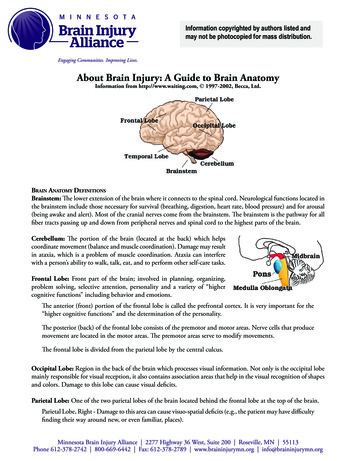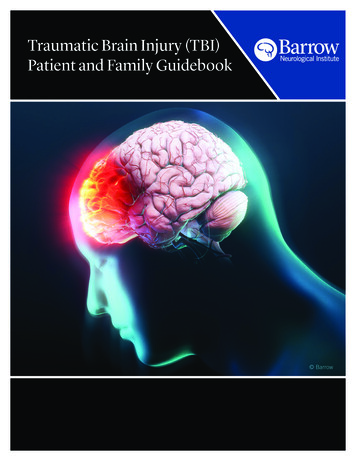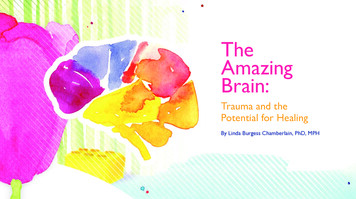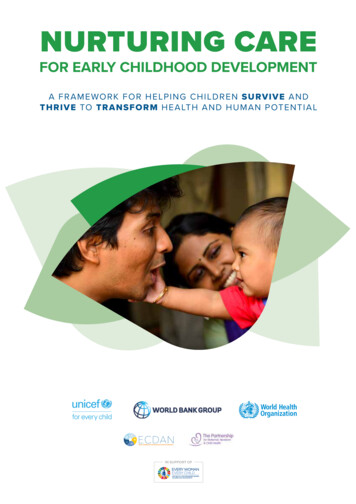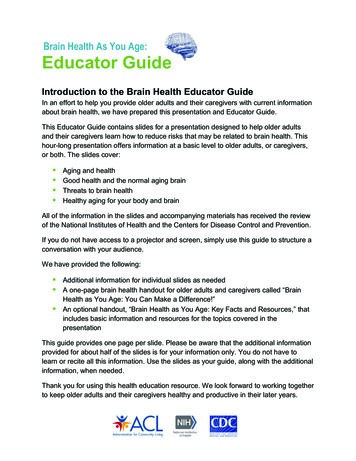
Transcription
Brain Health As You Age:Educator GuideIntroduction to the Brain Health Educator GuideIn an effort to help you provide older adults and their caregivers with current informationabout brain health, we have prepared this presentation and Educator Guide.This Educator Guide contains slides for a presentation designed to help older adultsand their caregivers learn how to reduce risks that may be related to brain health. Thishour-long presentation offers information at a basic level to older adults, or caregivers,or both. The slides cover: Aging and healthGood health and the normal aging brainThreats to brain healthHealthy aging for your body and brainAll of the information in the slides and accompanying materials has received the reviewof the National Institutes of Health and the Centers for Disease Control and Prevention.If you do not have access to a projector and screen, simply use this guide to structure aconversation with your audience.We have provided the following: Additional information for individual slides as needed A one-page brain health handout for older adults and caregivers called “BrainHealth as You Age: You Can Make a Difference!” An optional handout, “Brain Health as You Age: Key Facts and Resources,” thatincludes basic information and resources for the topics covered in thepresentationThis guide provides one page per slide. Please be aware that the additional informationprovided for about half of the slides is for your information only. You do not have tolearn or recite all this information. Use the slides as your guide, along with the additionalinformation, when needed.Thank you for using this health education resource. We look forward to working togetherto keep older adults and their caregivers healthy and productive in their later years.
Brain Health Educator Guide 2014Slide 1: Brain Health as You AgeA presentation by:1Page 2
Brain Health Educator Guide 2014Slide 2: Aging and HealthAging and Health Aging well depends on your: Genes Environment Lifestyle Healthy lifestyle choices may help youmaintain a healthy body and brain2Page 3
Brain Health Educator Guide 2014Slide 3: Age-Related Changes in Memory and LearningAge-Related Changes inMemory and LearningYou may find: Increased difficulty finding words More problems in multi-tasking Mild decreases in ability to pay attentionYou can still: Learn new things Create new memories Improve vocabulary and language skills3Page 4
Brain Health Educator Guide 2014Slide 4: Possible Risks or Threats to Brain HealthPossible Risks or Threatsto Brain Health Some medicines, or improper use of themSmokingExcessive use of alcoholHeart disease, diabetes, and other health problemsPoor dietInsufficient sleepLack of physical activityLittle social activity and being alone most of the time4Page 5
Brain Health Educator Guide 2014Slide 5: Medicines and Brain HealthMedicines and Brain HealthSome medicines – and combinations of them –can affect your thinking and the way your brainworks.Talk with your health care providerabout the drugs you take andpossible side effects on memory,sleep and brain function.5Additional InformationChecking with your health care provider is important.In addition, some community organizations, such as Area Agencies on Aging, holdmeetings where health professionals go over peoples’ medicines.Page 6
Brain Health Educator Guide 2014Slide 6: Smoking and Brain HealthSmoking and Brain Health Benefits of quitting smoking at any age: Lower risk of heart attacks, stroke, and lungdisease Better blood circulation Not exposing others to second-hand smokeThere are free resources availableto help you quit smoking.6Page 7
Brain Health Educator Guide 2014Slide 7: Alcohol’s Effect on Brain HealthAlcohol’s Effect on Brain Health Slow or impaired communication among braincells, even with moderate use Poor driving, slurred speech, fuzzy memory,drowsiness, dizziness Long-term changes to balance, memory andemotions, coordination, and bodytemperatureStaying away from alcohol can reverse some changes.Some medicines can be dangerous when mixed with alcohol.7Additional InformationAlcohol may act differently in older adults than in younger people. Some older adultscan feel “high” without increasing the amount of alcohol they drink. This can make themmore likely to be confused or have accidents, including falls, broken bones andfractures and car crashes, which can cause head injuries among other problems.If people choose to drink alcohol, U.S. Dietary Guidelines for Americans say thatmoderate drinking is up to two drinks a day for men, and one for women.Some people should not drink alcohol. Many older adults should be extra carefulbecause they often take medicines that can interact with it. For example: Alcohol and over-the-counter cough and cold remedies together can causedrowsiness and potential accidental overdoses. Older people are at even greaterrisk for these side effects Using alcohol with common blood pressure medicines can increase risk fordizziness, drowsiness, and changes in heartbeatPage 8
Brain Health Educator Guide 2014Slide 8: Common Conditions that Affect Brain HealthCommon Conditionsthat Affect Brain Health Heart disease, high blood pressureDiabetesAlzheimer’s diseaseStrokeTraumatic brain injuryDepressionSleep problems8Page 9
Brain Health Educator Guide 2014Slide 9: Heart Disease and High Blood PressureHeart Disease andHigh Blood PressureHeart disease and high blood pressure can leadto stroke and blood vessel changes related todementia.How to reduce risk: Control cholesterol and high blood pressure Exercise Eat healthy foods Quit smoking Limit use of alcohol9Additional InformationMany people with high blood pressure and heart disease do not know it, so it isimportant for you to get the recommended screenings for these health conditions.Page10
Brain Health Educator Guide 2014Slide 10: DiabetesDiabetes Damages blood vessels throughout your body,including your brain Increases risk for stroke and heart attack May increase risk for memory problems andAlzheimer’s disease Maintaining a healthy weight through physicalactivity and healthy eating can prevent orcontrol diabetesTalk with your health care provider about the combinationof lifestyle and medicine that works for you.10Additional InformationMany people with diabetes do not know that they have it. Sometimes, people withdiabetes may feel unusually tired, urinate frequently, or feel very hungry or thirsty. If youhave these symptoms, it is important to get screened.Diabetes type 1 is not preventable.Page11
Brain Health Educator Guide 2014Slide 11: Alzheimer’s DiseaseAlzheimer’s DiseaseAlzheimer’s is a buildup of harmful proteins in the brain,the death of brain cells, and loss of connections amongthem. Known risks: Age Genes, in some people Head injury Suspected risks: Heart diseaseHigh blood pressure at mid-lifeLack of physical activityDepressionDiabetes11Additional InformationPeople with dementia have significant problems with cognition – the ability to think,learn, and remember. Alzheimer’s disease is the most common form of dementia.You should know that some conditions can mimic dementia, like hearing loss anddepression. Also, some medicines can cause confusion and memory problems. So, it isimportant for you to check with your health care providers to rule out these potentialproblems.Page12
Brain Health Educator Guide 2014Slide 12: Alzheimer’s Disease (continued)Alzheimer’s Disease(continued) Some therapies can treat Alzheimer’s symptoms.They do not slow down the disease’s changes in thebrain. Some approaches show promise in reducing risk ofcognitive decline or Alzheimer’s, but need moretesting: ExerciseHealthy dietControlling high blood pressure, heart disease, diabetesCognitive “brain” training12Additional InformationDeveloping Alzheimer’s disease has been linked to a number of risk factors, likediabetes, heart disease, high blood pressure, and lack of exercise. Researchers arestudying whether specific ways of controlling these conditions or being active mayreduce risk of developing the disease or prevent cognitive decline. Cognition is theability to think, learn, and remember.There is a lot of interest in research on “cognitive training.” Researchers areinvestigating whether training in specific tasks will help maintain brain function. So far,studies show that some of this training can help improve skills in the training subjectarea. More research is being done to see how training might help people outside of theresearch setting.Page13
Brain Health Educator Guide 2014Slide 13: Brain InjuryBrain Injury Older adults are at higher risk of falling andother accidents that can cause brain injuryHow to reduce risk: Exercise to improve balance andcoordination Take a fall prevention class Make your home safer Review medicines and vision with yourhealth care provider Wear safety belts and helmets Get enough sleep13Page14
Brain Health Educator Guide 2014Slide 14: DepressionDepression Feelings of sadness or loss of interest in favoredactivities that last for weeks at a time Not a normal part of aging Some medicines can causedepression Confusion or attention problemscaused by depression cansometimes look like dementia Treatment can involve therapy and medicine14Additional InformationIf you or someone you care about is in crisis, please seek help immediately. Call 911 Visit a nearby emergency department or your health care provider's office Call the toll-free, 24-hour hotline of the National Suicide Prevention Lifeline at 1800-273-TALK (8255) or 1-800-799-4TTY (4889) to talk to a trained counselorPage15
Brain Health Educator Guide 2014Slide 15: Sleep ApneaSleep Apnea Short pauses in breathing while sleeping Can lead to injury, high blood pressure,stroke, or memory loss, all of which canaffect brain health Treatment begins with lifestyle changes,such as avoiding alcohol, losing weight, andquitting smoking Use of special devices, ordered by yourdoctor, may also help15Page16
Brain Health Educator Guide 2014Slide 16: So, What Can You Do to Protect Brain Health?So, What Can You Doto Protect Brain Health?Actions that may help: Take care of your health Eat healthy foods Be active Learn new things Connect with family, friends, and communities16Additional InformationSome of these actions can help maintain brain health. Others are still being studied tosee how they might affect brain health. We do know that the actions listed in this slideare good for healthy aging.Page17
Brain Health Educator Guide 2014Slide 17: Take Care of Your HealthTake Care of Your Health Get recommended health screenings Manage health problems like diabetes, highblood pressure, and high cholesterol Consult with your health care provider tomake sure your medicines are right for you Reduce risk for brain injuries due to falls,and other types of accidents Quit smoking17Additional InformationMedicare beneficiaries are entitled to a free “Welcome to Medicare” visit within 12months of joining the program as well as a free annual wellness visit.Page18
Brain Health Educator Guide 2014Slide 18: Eat HealthilyEat Healthily Fruits and vegetablesWhole grainsLean meats, fish, poultryLow-fat or non-fat dairy productsLess solid fat, sugar and saltProper portion sizesAdequate fluidsLook into healthy meal programs, like those provided byyour Area Agency on Aging.18Additional InformationNutrition programs at Area Agencies on Aging provide meals and related services toolder adults in a variety of places like senior centers, or in older people’s homes, if theyare homebound.Page19
Brain Health Educator Guide 2014Slide 19: Get MovingGet Moving Physical activity may: Reduce risks of diabetes, heart disease,depression, and stroke Prevent falls Improve connections among brain cells Get at least 150 minutes of exercise each week.Move about 30 minutes on most days. Walking is agood start. Join programs that can help you learn to move safely. Check with your health care provider if you haven’tbeen active and want to start a vigorous exerciseprogram.19Additional InformationPhysical activity is one of the most important things an older adult can do for health. Itcan prevent or reduce your risk of health problems that seem to come with age, whichinclude some of the diseases and conditions associated with brain health. It also helpsyou stay strong so that you can continue to do your day-to-day activities independently.In fact, not doing physical activity can be bad for you, no matter your age or healthcondition.If you are 65 or older and generally fit, with no limiting health conditions, you can benefitfrom doing aerobic and muscle-strengthening activities each week, using theseguidelines: A combination of 2 hours and 30 minutes (150) minutes of moderate aerobicactivity (such as brisk walking), with 2 or more days a week working all majormuscle groups (legs, hips, back, abdomen, chest, shoulders, and arms) A combination of 1 hour and 15 minutes (75 minutes) of vigorous-intensityaerobic activity (such as jogging or running), with 2 or more days a week workingall major muscle groups A balanced mix of moderate- and vigorous-intensity aerobic activity, with 2 ormore days a week working all major muscle groupsPage20
Brain Health Educator Guide 2014Slide 20: Keep Your Mind ActiveKeep Your Mind Active Do mentally stimulating activitiesRead books and magazinesPlay gamesLearn new thingsTake or teach a classBe social through work or volunteeringClinical trials have not proven that these types of activitieswill prevent Alzheimer’s disease, but they can be fun.20Page21
Brain Health Educator Guide 2014Slide 21: Stay ConnectedStay Connected People who have meaningful activities, likevolunteering, say they feel happier andhealthier Social activities are linked to reduced riskfor some health problems, includingdementia Join in social and other programs throughyour Area Agency on Aging, Senior Center,or other community organizations21Page22
Brain Health Educator Guide 2014Slide 22: What Can You Do Today?What Can You Do Today? Pick one thing you can do that may help yourbrain Think of small, first steps such as: Taking a 10-minute walk a few times a week Adding one serving of vegetables each day Making an appointment for health screenings or aphysical exam Write down what you will do and when Get support from family, friends, orcommunity groups!22Page23
Brain Health Educator Guide 2014Slide 23: For More InformationFor More Information Community Programs: Contact a local Area Agency on Aging (AAA) Contact a local Aging & Disability Resource Center (ADRC) Or, go to http://eldercare.gov/ National Institutes of Health: http://nih.gov National Institute on Aging at NIH: http://nia.nih.gov ClinicalTrials.gov, a service of NIH: http://clinicaltrials.gov Centers for Disease Control and Prevention: http://www.cdc.gov/aging http://www.cdc.gov/physicalactivity23Additional InformationHighlight local programs and refer to the following handouts if you have them availableto distribute: Brain Health as You Age: You Can Make a Difference! Brain Health as You Age: Key Facts and ResourcesIn addition to health information, the NIH website has links to clinical trial opportunitiesfor a variety of conditions and diseases related to brain health, including stroke,diabetes, Alzheimer’s disease, and depression, at www.clinicaltrials.gov. An NIH-fundedsite www.researchmatch.org connects interested people with researchers through afree, secure website.Page24
A one-page brain health handout for older adults and caregivers called “Brain Health as You Age: You Can Make a Difference!” An optional handout, “Brain Health as You Age: Key Facts and Resources,” that includes basic information and resources for the topics covered in
